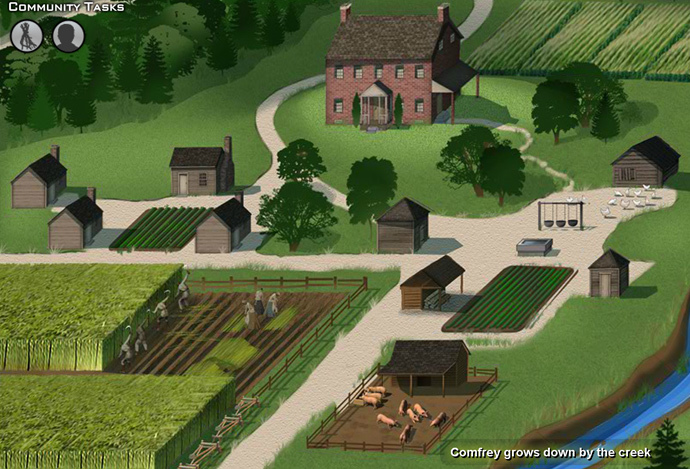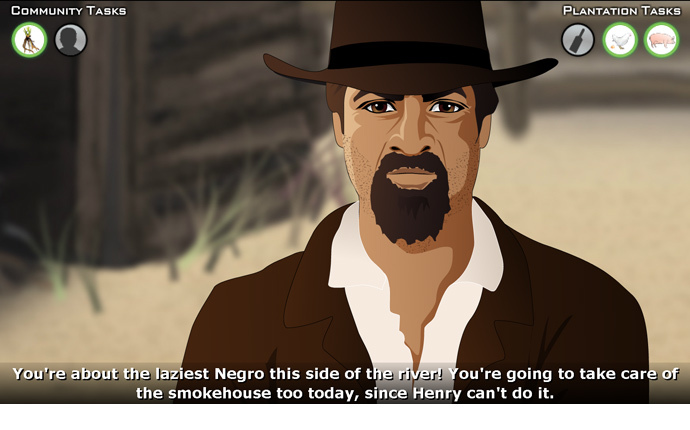US slavery simulation game draws criticism for making oppression ‘fun’
A computer game simulating the experiences of a US slave girl in the 19th Century has sparked outrage across the country. Critics believe the game doesn’t depict the true brutality of slavery and students should look to other resources to learn about it.
The educational learning program in question is called ‘Flight to Freedom’ and chronicles the experiences of a 14-year-old black slave called Lucy King, who works on a slave plantation in Kentucky. Users have to try and help her escape to the north of the country, where slavery has been abolished.
@RafranzDavis@LisGurthie@EdSurge This game is damaging to students and teachers. The idea that a #slavesimulation is ok denigrates us all
— Jordan (@gowithjordan) February 19, 2015
Upon learning about the game, after she received an email, recommending its use to coincide with Black History month, Rafranz Davis, who is an Instructional Technology Specialist for Schools, took to social media to vent her disgust.
“You would like to be a slave? The idea that a game could give a person a sense of what it felt like to fear for your life, to know everything that could possibly happen to you, which could be rape, a beating, death, mutilation is preposterous,” she told RT.

She believes that games are not the correct way to teach the true atrocities and hardships faced by slaves, and says rather than trying to make slavery “fun,” children would be better off reading about slavery or speaking with those who have connections to it.
“It’s geared for 5th to 8th grade students under the guise that students can only learn if it is fun, if they can win points. That is not the case. You can have rich conversations with students. You can get them to dig into primary sources and research and get them to speak to people who still have connections to that point in history, without going down through this watered down look at history,” Davis added.
I'm still pissed off about #slavesimulation - trying to focus on checking my own choices in past &telling everyone I know about it.
— Jamie Gravell (@Dontworryteach) February 16, 2015
My 15yo son on #slavesimulation "I think the people that made it didn't think about what somebody like me would feel"
— Rafranz Davis (@RafranzDavis) February 16, 2015
The game has been available for use for a number of years and has received positive reviews from teachers and parents. Kid-Tech columnist for USA Today said it was “realistic,” “brilliant,” “ingenious” and “fascinating.”
“From hearing spirituals being sung in the beginning of the game to Lucy's haunting voice at the end recalling her journey, this is a powerful game that all kids should experience,” Jinny Gudmundsen wrote.
Speaking to Education Weekly, Kellie Castruita Specter, the senior director of communications and marketing for WNET television station, which helped to produce the game, said that she stands-by the project as being a positive educational tool to help learn about slavery.

"Our goal [with 'Flight to Freedom'] is for all students to develop a greater respect for African-Americans' struggle and African-American history as a part of American history. Although we regret to hear that some people have found the game to be problematic, we stand by it,” she said.
Incredibly problematic, condescending, and tone deaf that @Mission_US responds to #slavesimulation as a PR issue. // @CPBmedia@ThirteenNY
— Bill Fitzgerald (@funnymonkey) February 18, 2015
.@WNETEducation How do you not get it? This is just wrong! Anyone "playing the game" should see it. http://t.co/IXj0KOJWti#slavesimulation
— jake duncan ☕️ (@jkdncn) February 19, 2015
Some experts in slavery and race relations also said they were in favor of the game.
"We're already teaching slavery in a way that's inaccurate, insensitive, and ahistorical," said James Braxton Peterson, who is the director of the Africana Studies department at Lehigh University in Pennsylvania. "I'm actually in favor of a more sophisticated, enhanced version of this game," he added, which was reported by Education Weekly.
We're thrilled "Flight to Freedom" won a Gold Medal at this year's Serious Play Awards. Congrats to all the winners! http://t.co/9jAATipF
— Mission US (@Mission_US) August 31, 2012
The game was part a multimedia project called Mission US. It has almost a million registered users, of which 860,000 are children. It’s part of a larger initiative set up by the Corporation for Public Broadcasting to evaluate the potential benefits of using digital history games to help students learn about past events.
The project also has four other simulations, ranging from a Native American boy called Little Fox, who experiences the onset of settlers heading west, to Lena, who is a Russian immigrant Jew living in New York, who has to put up with long working hours and poor conditions as she tries to save money to bring her relatives over to the US.












